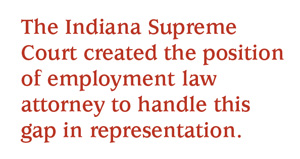The unpleasant day might arrive when a summons or a notice arrives that names a judge as a defendant. Do not fret, just send it to me! There are four primary types of notices or summons that may land on a judge’s desk: unemployment claims, discrimination charges, notice of tort claims and actual lawsuits. The type of response will depend on the nature of the case or complaint. In every civil case you can count on the assistance of the Indiana Supreme Court’s Division of State Court Administration.
A self-represented individual is the most likely litigant to file a federal or state claim against a judge. These lawsuits typically assert that the judge has deprived the plaintiff of a constitutional right. It is often a collateral attack on a domestic relations order or on the entry of a criminal judgment or sentence. A judge who is subject to this type of action should make a courtesy call to me with some background information and we will have a brief initial conversation. Please ask your assistant to send the complaint and summons to me by fax or by email as a scanned attachment, including information about the date and method of service.
 On behalf of the judge who has been sued, we will request representation from the Office of the Attorney General to defend a judge who is sued in his or her official capacity. Indiana Attorney General Greg Zoeller has an entire team of experienced attorneys who are adept at making the proper summary motions to dispose of such collateral attacks. As he recently quipped at the Bar Admission Ceremony, his Deputies “zoellerously” defend all cases. By sending the request for representation through me, a judge will be assured that the complaint will be properly assigned and that timely follow-up information will be sent. Judges may use me as a go-between or resource if there are questions regarding the lawsuit. In those rare situations where the lawsuit involves a direct challenge to an Indiana Rule of Court or a statewide court practice, multiple staff members from the Supreme Court agencies may be enlisted to provide support, give guidance, and act as a client representative.
On behalf of the judge who has been sued, we will request representation from the Office of the Attorney General to defend a judge who is sued in his or her official capacity. Indiana Attorney General Greg Zoeller has an entire team of experienced attorneys who are adept at making the proper summary motions to dispose of such collateral attacks. As he recently quipped at the Bar Admission Ceremony, his Deputies “zoellerously” defend all cases. By sending the request for representation through me, a judge will be assured that the complaint will be properly assigned and that timely follow-up information will be sent. Judges may use me as a go-between or resource if there are questions regarding the lawsuit. In those rare situations where the lawsuit involves a direct challenge to an Indiana Rule of Court or a statewide court practice, multiple staff members from the Supreme Court agencies may be enlisted to provide support, give guidance, and act as a client representative.
A Notice of Tort Claim may precede the filing of a complaint. In that case, the judge may fax or scan the Notice to me and I will request representation on behalf of the judge. It is common practice for the Attorney General’s Tort Claim section to not respond to the Notice as a claim is deemed denied if not approved within 90 days.
Employees and others with standing may bring charges against judges alleging discrimination based on sex, age, race, national origin, or religion. The Equal Employment Opportunity Commission, the Indiana Civil Rights Commission, or a local civil rights commission may also allege discrimination against a judge. The Office of the Attorney General does not generally handle administrative agency matters, and would only enter an appearance on behalf of a judge under certain circumstances. One example would be when the AG’s office is already involved in a related federal lawsuit. However, even if the Attorney General would not be involved, a judge will still be represented by counsel.
The Indiana Supreme Court created the position of employment law attorney to handle this gap in representation. Upon receipt of a charge of discrimination, a judge should immediately send it to me. I will enter an appearance on your behalf and prepare for your defense. Especially for judges in courts with small staffs, there are multiple jurisdictional defenses that may be made. Often a discrimination charge is filed that names the wrong entity or is filed against both a state judge and the county where the judge presides. We can collaborate to determine the appropriate defense counsel.
The Division of State Court Administration will also assist in the defense of claims by terminated employees. Judges should consult with me prior to terminating an employee. We will help protect the judge from charges of discrimination or complaints of constitutional violations. A prior consultation also gives us the opportunity to discuss what to do if an unemployment claim is filed, including whether it will be handled by the county attorney or this office.
The time between receiving an unemployment claim and the deadline for responding is brief—sometimes less than 48 hours. There may be no time to gather the necessary information if we learn of the termination after an unemployment claim is filed. If it is probable that an unemployment compensation claim defense may be successful, then as a matter of responsibility to the taxpayer, it will be contested. If there is little or no probability that a defense will be successful, then it will not be contested. We can assist with any unemployment compensation claim from a former court employee. In addition, Magistrate, Commissioner, and Chief Deputy Prosecutor claims are all paid directly from the Supreme Court account. It is important on these claims that the Court’s employment law attorney be given the opportunity to examine whether or not a protest should be made for such unemployment benefits claims.
While it is never a heart-warming experience to get served with a Notice, Charge or Summons, each judge may be assured that there are mechanisms set up through the Division of State Court Administration and the Office of Attorney General to provide full representation. First step in each case: send it to me!
 If a judge needs assistance or advice about these matters, contact Brenda Rodeheffer at (317) 234-3936 or
If a judge needs assistance or advice about these matters, contact Brenda Rodeheffer at (317) 234-3936 or